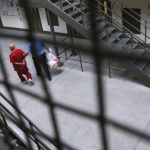
A guard escorts an immigrant detainee through the Adelanto Detention Facility in Adelanto, California, where around 2,000 detainees of Immigration and Customs Enforcement await hearings on their immigration status.
John Moore/Getty Images
The HCN backgrounds that “… under government policies, asylum seekers who pass their “credible fear” interview should be released from detention if their “identity is sufficiently established, the person poses neither a flight risk nor a danger to the community, and no additional factors weigh against release.”
But the HCN report details an array of incentives, including financial motives both public and private, for keeping people in jail longer. For example, the paper says, “… in 2012, 80 percent of asylum seekers who passed their credible fear interview were granted parole. By 2015, the number had dropped to 47 percent. The sharp drop coincided with an influx of migrants from Guatemala, El Salvador and Honduras, many of them asylum-seekers. On June 20, 2014, Secretary of Homeland Security Jeh Johnson announced a plan to significantly expand detention capacity to detain and quickly deport Central Americans, in an attempt to ‘send a message’ to those seeking asylum or attempting to cross the border illegally.